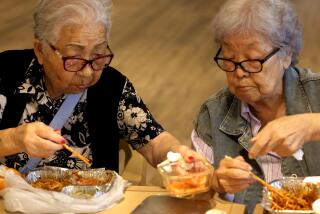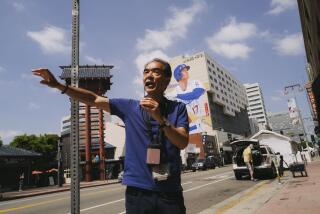LITTLE TOKYO : Police Substation Site Gets a Blessing
- Share via
Tossing salt grains at the entrance and bowing before an altar, the reverend blessed the rundown building that will be refurbished for Little Tokyo’s first police substation.
The ceremony was part of last Wednesday’s groundbreaking for the long-awaited koban , as a roadside police booth is commonly known in Japan. The celebration of the substation, which community members have lobbied for since 1990, attracted a host of dignitaries and hopes for a safer Little Tokyo.
“It will set a tone on the streets that Little Tokyo is not a place to commit petty crimes,” said Los Angeles Police Capt. Richard Bonneau.
The substation, at 1st and San Pedro streets, will be open daily from 10 a.m. to 11 p.m., link Little Tokyo more closely to the Police Department and hopefully revive tourism, said Howard Nishimura of the Greater Little Tokyo Anti-Crime Assn.
“We want Japanese tourists to stay in Little Tokyo when they visit. Now they are staying near Disneyland or in Santa Monica and other outlying areas because they think downtown is unsafe,” Nishimura said. “We hope the koban will bring them here and help them feel safe.”
The substation also will serve as an information center with full-time Japanese-speaking staff members assisting police with crime reports, providing translation and referrals to local social services.
The 47 volunteers who patrol Little Tokyo will move out of Mitsuru Grill restaurant at 360 E. 1st Street, their current base, and work out of the substation by next February, organizers hope.
In 1992, a rash of car break-ins, burglaries and graffiti prompted the formation of the anti-crime association and the safety patrol program. Since then, Nishimura said, crime in Little Tokyo has decreased by 25%. Volunteers worked with police officers to set up surveillance in high-crime areas, resulting in seven arrests and convictions for car burglaries, the association reported.
“The koban is a tremendous example of community-based policing,” said state Atty. Gen. Dan Lungren. “It’s an invitation for law enforcement to be a permanent presence in the community.”
Bonneau added: “The safety patrols have really been our eyes and ears. This koban will allow us to be more efficient.”
Tanizawa Masami, president of Matsuzakaya department store in Little Tokyo, said when Japanese people hear the word koban , they think of safety.
“They are very popular in Japan,” he said.
There are roughly 1,000 kobans in Tokyo, where Japan police officers are stationed around the clock to patrol the streets, control traffic and make house calls. Nishimura added that Japanese kobans are typical social centers where locals bring food to the police or gather for community meetings.
“Even though we have the police station right here, near Little Tokyo, no one ever goes there,” he said. “With the koban we can open communication lines and build a sense of camaraderie.”
More to Read
Sign up for Essential California
The most important California stories and recommendations in your inbox every morning.
You may occasionally receive promotional content from the Los Angeles Times.













